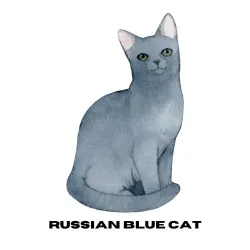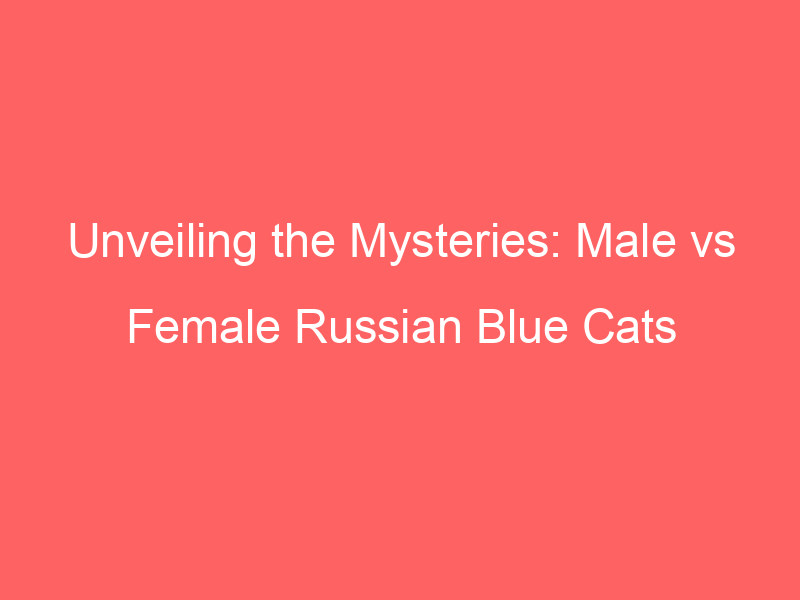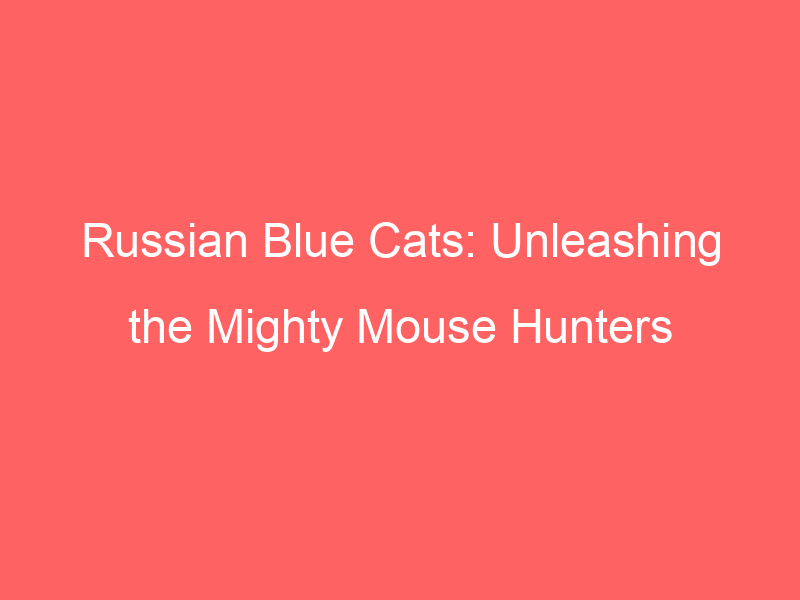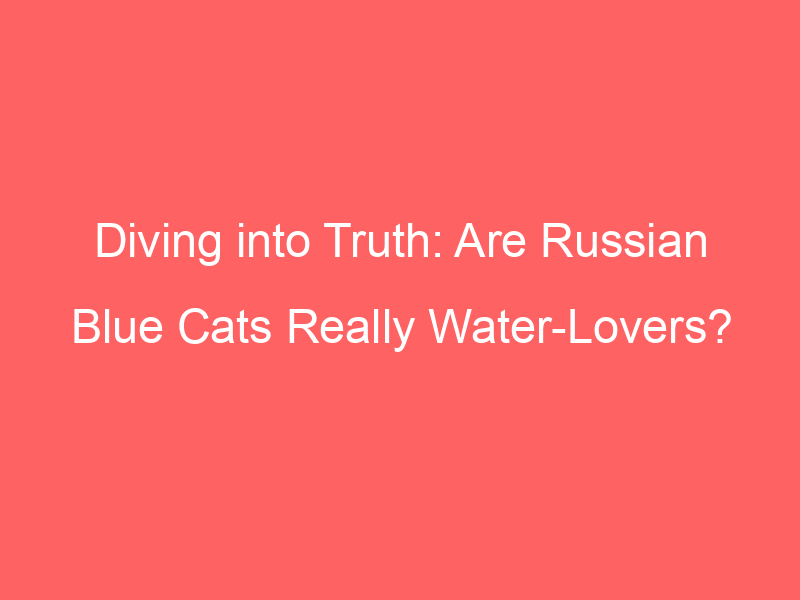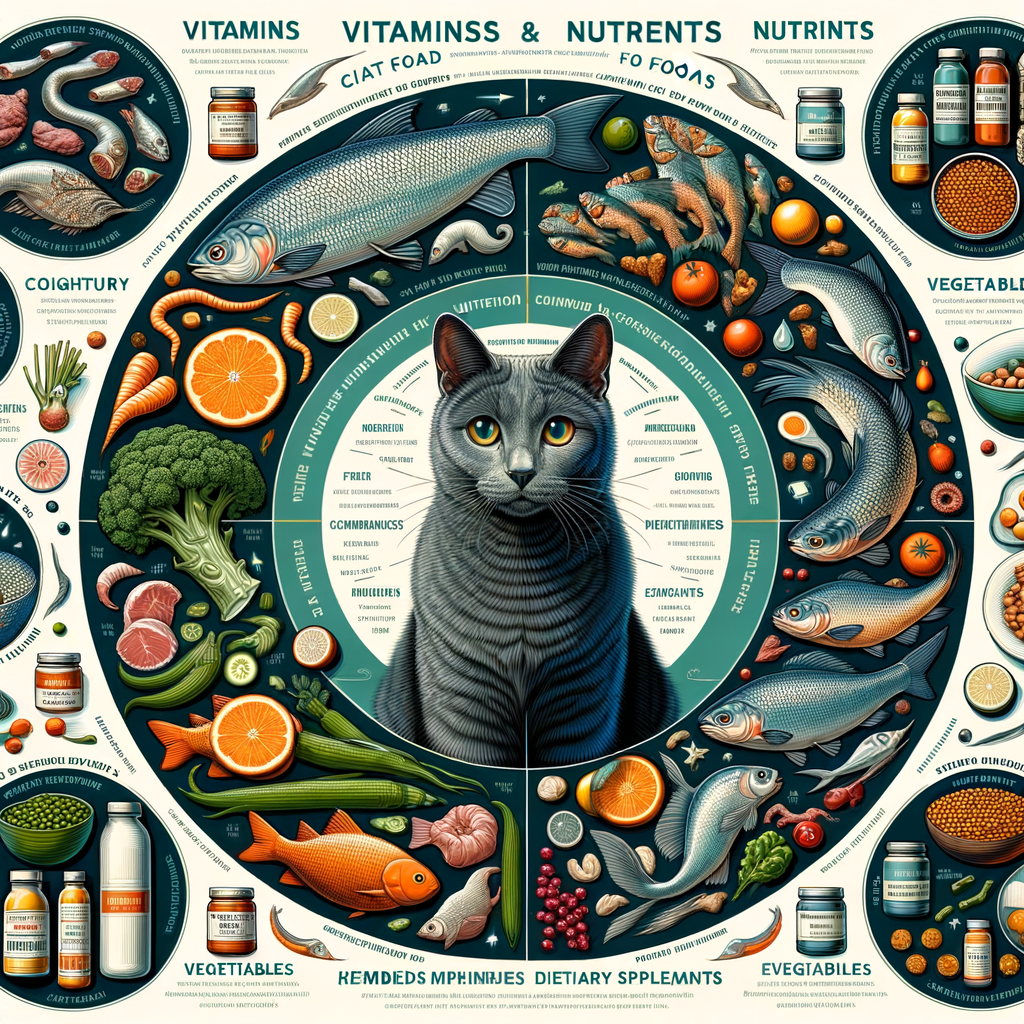
Introduction to Russian Blue Cat Nutrition
When it comes to taking care of your Russian Blue Cat, nutrition plays a crucial role. A well-balanced diet is essential for your cat’s overall health and well-being. In this section, we will delve into understanding the nutritional needs of a Russian Blue Cat and the importance of a balanced diet.
- Understanding the nutritional needs of Russian Blue Cat
Just like humans, cats too have specific nutritional needs. Russian Blue Cats, in particular, require a diet rich in protein, fats, and carbohydrates. Protein is vital for their growth and development, while fats provide them with energy. Carbohydrates, on the other hand, aid in digestion and help maintain their weight.
It’s also important to note that Russian Blue Cats need certain vitamins and minerals for their body to function properly. These include Vitamin A for good vision, Vitamin D for bone health, and taurine, an essential amino acid for heart health.
- Importance of a balanced diet for your Russian Blue Cat
A balanced diet is key to your Russian Blue Cat’s health. It ensures they get all the necessary nutrients they need to stay healthy and active. A diet lacking in essential nutrients can lead to various health issues such as obesity, dental problems, and even serious conditions like heart disease.
Feeding your Russian Blue Cat a balanced diet not only keeps them healthy but also contributes to their shiny coat and bright eyes. It also helps them maintain a healthy weight, reducing the risk of obesity and related health problems.
In conclusion, understanding your Russian Blue Cat’s nutritional needs and providing them with a balanced diet is crucial for their health and well-being. Remember, a healthy cat is a happy cat!
Essential Nutrients for Cats
One of the key components of a healthy diet for any cat, including the Russian Blue, is the right balance of essential nutrients. Among these, proteins play a particularly crucial role.
Proteins
Proteins are vital for the health and well-being of your cat. They are the building blocks of the body, supporting growth and maintaining overall health.
- Role of proteins in cat nutrition
- Sources of proteins for Russian Blue Cat
Proteins are essential for a variety of functions in a cat’s body. They help in growth and development, especially in kittens. Proteins are also necessary for repairing body tissues and maintaining a healthy immune system. They provide energy and are essential for the production of hormones and enzymes that regulate bodily functions. In addition, proteins contribute to healthy skin and coat, and they are crucial for the production of antibodies, which help fight off infections.
Protein sources for your Russian Blue cat should be high-quality and animal-based. This breed thrives on a diet that includes a variety of meats. Chicken, turkey, fish, and beef are all excellent sources of protein for your Russian Blue. Other sources can include eggs and dairy products. It’s important to note that while plant-based proteins exist, they are not as easily digested or utilized by your cat’s body as animal-based proteins.
Remember, a balanced diet is key to your cat’s health. While proteins are essential, they should be part of a diet that includes all necessary nutrients. Always consult with your vet to ensure your Russian Blue is getting the right balance of proteins and other nutrients.
Fats
Fats are an essential part of a cat’s diet, especially for Russian Blue Cats. They provide energy, support cell growth, protect organs, and help the body absorb certain vitamins. Let’s delve deeper into the importance of fats in a cat’s diet and identify healthy sources of fats for your Russian Blue Cat.
- Importance of fats in cat diet
- Healthy sources of fats for Russian Blue Cat
Fats are a crucial part of a cat’s diet. They provide more than twice the energy of proteins or carbohydrates. Fats are also necessary for the absorption of vitamins A, D, E, and K, known as the fat-soluble vitamins. Furthermore, fats contribute to a cat’s skin and coat health, making them look shiny and feel soft. They also help in reducing inflammation.
When it comes to providing your Russian Blue Cat with healthy fats, there are several options. Fish, such as salmon and mackerel, are excellent sources of omega-3 fatty acids, which are beneficial for heart health. Chicken and turkey are also good sources of healthy fats. Other sources include flaxseed oil and fish oil supplements. However, it’s important to remember that all fats should be given in moderation to maintain a balanced diet.
| Source | Type of Fat |
|---|---|
| Salmon | Omega-3 fatty acids |
| Mackerel | Omega-3 fatty acids |
| Chicken | Monounsaturated and Polyunsaturated fats |
| Turkey | Monounsaturated and Polyunsaturated fats |
| Flaxseed oil | Omega-3 fatty acids |
| Fish oil supplements | Omega-3 fatty acids |
In conclusion, fats are a vital part of your Russian Blue Cat’s diet. They provide energy, help absorb vitamins, and contribute to a healthy coat. However, it’s crucial to provide fats from healthy sources and in the right amounts to ensure your cat’s overall health and well-being.
Carbohydrates
Carbohydrates are a crucial part of a balanced diet for any living being, including cats. While it’s true that cats are carnivores by nature, carbohydrates play a significant role in providing them with the energy they need for their daily activities.
- Understanding the role of carbohydrates in cat diet
- Recommended carbohydrate sources for Russian Blue Cat
Carbohydrates are an essential source of energy for cats. They help fuel the brain, kidneys, heart, and muscles during rest and physical activity. While cats can survive without carbohydrates in their diet, providing them with a small amount can help ensure they have the energy they need to thrive.
When it comes to feeding your Russian Blue Cat, it’s important to choose high-quality carbohydrate sources. Some recommended options include sweet potatoes, peas, and carrots. These foods are not only rich in carbohydrates but also provide essential vitamins and minerals.
Remember, while carbohydrates are important, they should not make up the majority of your cat’s diet. The majority of their diet should still be high-quality protein sources. Always consult with your vet to determine the best diet for your Russian Blue Cat.
| Carbohydrate Source | Benefits |
|---|---|
| Sweet Potatoes | Rich in fiber and vitamin A, sweet potatoes are a great source of carbohydrates for your Russian Blue Cat. |
| Peas | Peas are a good source of carbohydrates and also provide your cat with vitamin K and vitamin C. |
| Carrots | Carrots are not only a good source of carbohydrates but also provide your cat with essential vitamins like vitamin A and vitamin K. |
In conclusion, while carbohydrates are not the main component of a cat’s diet, they do play a significant role in providing your cat with the energy they need. Always ensure that the carbohydrates you feed your Russian Blue Cat are from high-quality sources.
Vitamins for Russian Blue Cat
One of the key components of a healthy diet for your Russian Blue cat is the right amount of vitamins. Among these, Vitamin A plays a crucial role.
Vitamin A
Vitamin A, also known as retinol, is a vital nutrient for cats, particularly for the Russian Blue breed. Let’s delve into the role it plays in cat health and where it can be sourced from.
- Role of Vitamin A in cat health
- Sources of Vitamin A for Russian Blue Cat
Vitamin A is essential for a cat’s overall health. It aids in maintaining good vision, especially in low light. It also supports the immune system, helping your Russian Blue cat fight off illnesses. Moreover, Vitamin A contributes to the health of your cat’s skin and coat, keeping them shiny and smooth.
There are several sources of Vitamin A that can be included in your Russian Blue cat’s diet. Some of the best sources are liver, fish oil, and egg yolks. Carrots, spinach, and other green leafy vegetables also contain Vitamin A, but cats cannot convert the plant-based form of Vitamin A into a form they can use. Therefore, it’s important to ensure they get this vitamin from animal-based sources.
| Food Source | Vitamin A Content |
|---|---|
| Liver | High |
| Fish Oil | Moderate |
| Egg Yolks | Low |
Remember, while Vitamin A is essential, too much of it can be harmful. Always consult with your vet to determine the right amount for your Russian Blue cat.
Vitamin D
Vitamin D is a crucial nutrient that plays a significant role in the health of our feline friends. Let’s delve into the importance of Vitamin D for cats and how you can ensure your Russian Blue Cat gets enough of this essential vitamin.
- Importance of Vitamin D for Cats
- How to Ensure Your Russian Blue Cat Gets Enough Vitamin D
- Diet: Feed your cat a balanced diet that includes sources of Vitamin D such as fish oil, beef liver, and egg yolks. Commercial cat foods are often fortified with Vitamin D.
- Supplements: If your cat’s diet isn’t providing enough Vitamin D, your vet may recommend a supplement. Always consult with your vet before starting any supplement regimen.
- Regular Check-ups: Regular vet visits can help monitor your cat’s Vitamin D levels and overall health. If your cat shows signs of a Vitamin D deficiency, such as loss of appetite or weight, lethargy, or bone deformities, seek veterinary care immediately.
Vitamin D, often referred to as the “sunshine vitamin,” is vital for cats, including the Russian Blue breed. It helps regulate the balance of calcium and phosphorus in their bodies, which is essential for bone health. A deficiency of Vitamin D can lead to serious health issues such as rickets, a condition that can cause weak or deformed bones.
Moreover, Vitamin D also supports the immune system, helping your cat fight off illnesses. It aids in the absorption of other nutrients and plays a role in nerve and muscle control. A study found that cats with heart disease often have lower levels of Vitamin D, indicating its importance in cardiovascular health.
Unlike humans, cats can’t produce Vitamin D through their skin. They rely on their diet to get this essential nutrient. Here are some ways to ensure your Russian Blue Cat gets enough Vitamin D:
Remember, while Vitamin D is essential, too much can be harmful. It’s all about balance. With the right diet and regular vet check-ups, you can ensure your Russian Blue Cat gets the right amount of Vitamin D for a healthy, happy life.
Vitamin E
Let’s talk about Vitamin E. This is another essential vitamin for your Russian Blue Cat. It has many benefits for your cat’s health and there are several ways to ensure your cat gets enough of it.
- Benefits of Vitamin E for Cat Health
Vitamin E is a powerful antioxidant. This means it helps to protect your cat’s body from harmful substances called free radicals. These can damage cells and lead to health problems. Vitamin E helps to keep your cat’s immune system strong, which is important for fighting off illnesses.
That’s not all. Vitamin E also plays a role in maintaining healthy skin and coat for your cat. It helps to keep your cat’s skin moisturized and their coat shiny. This is especially beneficial for Russian Blue Cats, known for their plush double coat.
Research has shown that Vitamin E can also support heart health in cats. It can help to prevent heart disease and keep your cat’s heart strong and healthy. This is particularly important for Russian Blue Cats, as they can be prone to heart conditions.
- Sources of Vitamin E for Russian Blue Cat
So, how can you make sure your Russian Blue Cat gets enough Vitamin E? There are several ways to do this.
Firstly, many commercial cat foods contain added Vitamin E. This is often listed on the label as ‘tocopherols’. So, one way to ensure your cat gets enough Vitamin E is to feed them a high-quality commercial cat food.
Secondly, Vitamin E can be found in certain foods that are safe for cats to eat. This includes fish like salmon and trout, as well as spinach and broccoli. However, it’s important to remember that these foods should only make up a small part of your cat’s diet. The majority of their diet should still be a balanced cat food.
Finally, there are also Vitamin E supplements available for cats. These can be a good option if your vet recommends them, but they should not be used as a substitute for a balanced diet.
In conclusion, Vitamin E is a vital part of your Russian Blue Cat’s diet. It has many health benefits and there are several ways to ensure your cat gets enough of it. Remember, a healthy cat is a happy cat!
Healthy Diet for Russian Blue Cat
Feeding your Russian Blue Cat a healthy diet is crucial for their overall health and wellbeing. A balanced diet can help maintain their sleek coat, sharp eyes, and robust health. Let’s delve into how you can create a balanced diet plan for your Russian Blue Cat, taking into account their age, weight, and health status.
-
Creating a Balanced Diet Plan for Your Russian Blue Cat
A balanced diet for a Russian Blue Cat should include a mix of proteins, fats, carbohydrates, and essential vitamins and minerals. Proteins can come from sources like chicken, fish, or beef. Fats provide energy and help absorb vitamins, while carbohydrates offer additional energy. Remember, your cat’s diet should be primarily meat-based, as cats are obligate carnivores.
Here’s a simple table to help you understand the nutritional needs of your Russian Blue Cat:
Nutrient Percentage Protein 40% Fats 30% Carbohydrates 30% -
Considering Your Cat’s Age, Weight, and Health Status
The age, weight, and health status of your Russian Blue Cat will significantly influence their dietary needs. Kittens require more protein and fat for growth, while adult cats need a balanced diet to maintain their health. Overweight cats may need a diet lower in calories but still nutritionally balanced. Always consult your vet before making significant changes to your cat’s diet, especially if they have any health conditions.
-
Examples of Healthy Meals for Russian Blue Cat
Healthy meals for your Russian Blue Cat could include a mixture of commercial cat food and homemade meals. For instance, a breakfast could be a portion of high-quality canned cat food, and dinner could be boiled chicken with a side of pumpkin puree. Always ensure the meals are appropriately portioned and balanced in nutrients.
Remember, every cat is unique, and what works for one might not work for another. Always monitor your Russian Blue Cat’s response to their diet and adjust as necessary. With the right diet, your Russian Blue Cat can lead a healthy, happy life.
Best Vitamins for Cats: Supplements vs Natural Sources
When it comes to the health of your Russian Blue Cat, vitamins play a crucial role. But where should these vitamins come from? Supplements or natural sources? Let’s delve into this topic to help you make an informed decision.
- Understanding the pros and cons of vitamin supplements
- How to choose the right vitamin supplements for your Russian Blue Cat
- Benefits of natural vitamin sources
Vitamin supplements are a popular choice for many pet owners. They are easy to administer and ensure your cat gets the necessary nutrients, regardless of their diet. However, they also have drawbacks. Overdosing can lead to health problems, and not all supplements are created equal. Some may not have the necessary nutrients your cat needs, while others may contain harmful additives.
Choosing the right supplement for your Russian Blue Cat can be a daunting task. Start by consulting with your vet. They can recommend a supplement based on your cat’s age, health status, and dietary needs. Look for supplements that are specifically designed for cats, and avoid those with artificial additives. Always follow the recommended dosage to avoid overdosing.
Natural sources of vitamins, such as fresh meat and fish, fruits, and vegetables, are an excellent choice for your Russian Blue Cat. They provide a wide range of nutrients in their most bioavailable form. This means your cat’s body can easily absorb and use these nutrients. Plus, a diet rich in natural foods can help prevent obesity, diabetes, and other health problems.
Remember, a balanced diet is key to your cat’s health. Whether you choose supplements or natural sources, make sure your Russian Blue Cat gets all the necessary vitamins and nutrients.
| Vitamin | Supplement | Natural Source |
|---|---|---|
| Vitamin A | Commercial cat supplements | Liver, fish oil, egg yolks |
| Vitamin D | Commercial cat supplements | Fatty fish, beef liver, egg yolks |
| Vitamin E | Commercial cat supplements | Spinach, broccoli, kiwi |
Whether you opt for supplements or natural sources, the most important thing is to ensure your Russian Blue Cat gets a well-rounded diet. Always consult with your vet before making any changes to your cat’s diet.
Russian Blue Cat Health: Monitoring and Maintenance
Keeping your Russian Blue Cat healthy involves more than just providing them with the right food. It also requires regular monitoring and maintenance. Here are some key steps to ensure your cat’s health and wellbeing.
- Regular vet check-ups for your Russian Blue Cat
- Signs of nutritional deficiencies to watch out for
- How to maintain your Russian Blue Cat’s health with proper nutrition
Just like humans, cats also need regular health check-ups. A routine visit to the vet can help identify any potential health issues early. Your vet can provide vaccinations, conduct health screenings, and offer advice on your cat’s diet and lifestyle. Aim for at least one vet visit per year, but more frequent check-ups may be necessary for kittens or older cats.
While Russian Blue Cats are generally healthy, they can still suffer from nutritional deficiencies. Some signs to watch out for include dull coat, lethargy, loss of appetite, and weight loss. If you notice any of these signs, consult your vet immediately. They can recommend dietary changes or supplements to address the deficiency.
Proper nutrition is the cornerstone of your cat’s health. A balanced diet for a Russian Blue Cat should include high-quality protein, healthy fats, and a small amount of carbohydrates. Avoid feeding your cat with human food as it may contain ingredients harmful to cats. Instead, opt for cat food specifically designed for their nutritional needs. Remember, a healthy diet can help prevent many health issues and ensure your cat lives a long, happy life.
In conclusion, monitoring and maintaining your Russian Blue Cat’s health involves regular vet visits, watching out for signs of nutritional deficiencies, and providing a balanced diet. By following these steps, you can ensure your cat stays healthy and happy.
